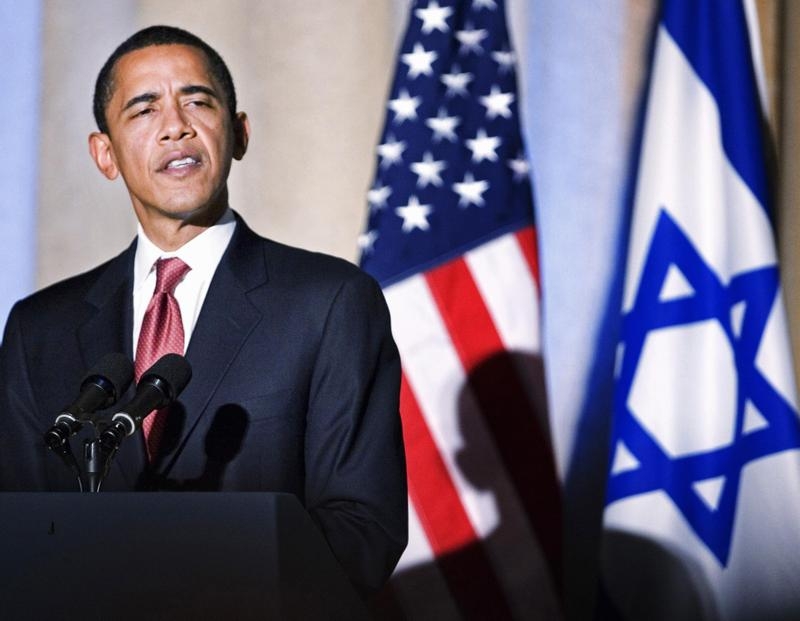
2011: More US Support for “Israel” For How Long can This Continue?

Ali RIZK
2011 could be considered the year of major losses for the US which resulted from the culmination of failed policies pursued by the previous administration of George W. Bush.
These failed policies were with respect to the Middle East and the economy, two areas where the current US administration is facing grave dilemmas.
When we talk of the Middle East the biggest American loss occurred at the end of 2011 with the US withdraw from Iraq, something which was considered a defeat for the US and a victory for its foes in the region. In particular it was seen as a victory for Washington's arch rival -Tehran particularly after the Maliki government refused to grant immunity to any remaining US troops.
Meanwhile the beginning of 2011 witnessed the birth of the Arab spring beginning in Tunisia in January which led to the downfall of former dictator Zain al-Abidin Bin Ali. This was followed by the great revolution in Egypt that ousted Hosni Mubarak, another pro-western leader. So 2011 witnessed an American defeat in Iraq and a loss of reliable American allies in Tunisia and especially in Egypt.
These developments have brought about some interesting developments in Washington's regional policy. For example the US administration is attempting to establish links and even good ties with the Islamic movements and parties who are turning out to be the most popular in countries like Egypt and Tunisia. In fact the New York times has written an article quoting unnamed American officials that Washington is trying to forge closer ties with the Muslim brotherhood in Egypt.( At the same time we also hear of US efforts to engage with the Taliban in Afghanistan).
However one thing which has not changed in Washington's regional or foreign policy is the old story of all out support for "Israel". Indeed US president Barak Obama has underscored time again the "unbreakable" bonds between the US and "Israel" and in practice has also set a record for US military aid to "Israel".(He even boasted about this himself:"I am proud to say that no other administration has done more in support of "Israel's" security than ours"- a quote he made to a Jewish audience in the US just a week ago).
 But this comes amid growing voices from within the US (not politicians of course) that are questioning "Israel's" strategic value for the US and its interests. Political Science professor at Notre Dame University in Lebanon Eugene Dabbous says that 2011 has shown "Israel" to be a strategic liability for the US more than ever before. According to Dabbous the rise of the extreme right represented by the Ultra Orthodox and the settler movement is behind this evaluation. "The extreme right has a separate agenda and is indifferent to American interests" says Dabbous echoing a similar analysis made by Haim Malka from the Center for Strategic and International studies. Towards the end of last year Malka published a study titled "Crossroads: The future of the American "Israeli" strategic partnership which argues that the rise of the right is complicating the US-"Israeli" alliance.
But this comes amid growing voices from within the US (not politicians of course) that are questioning "Israel's" strategic value for the US and its interests. Political Science professor at Notre Dame University in Lebanon Eugene Dabbous says that 2011 has shown "Israel" to be a strategic liability for the US more than ever before. According to Dabbous the rise of the extreme right represented by the Ultra Orthodox and the settler movement is behind this evaluation. "The extreme right has a separate agenda and is indifferent to American interests" says Dabbous echoing a similar analysis made by Haim Malka from the Center for Strategic and International studies. Towards the end of last year Malka published a study titled "Crossroads: The future of the American "Israeli" strategic partnership which argues that the rise of the right is complicating the US-"Israeli" alliance.
Furthermore Dabbous adds that the Washington interests lie in the emergence of pro western capitalist systems in countries like Egypt and Tunisia but that these countries would require something in return: most notably a solution to the Palestinian issue which "Israel" clearly doesn't want to work towards. What seems to back up this whole argument is how the US war secretary has apparently lost his temper at times towards the "Israeli" government. Towards the end of last year Panetta called on "Israel' to "get to the damned table" to reach a settlement for the Palestinian issue and also warned "Israel" of its growing isolation saying: "I believe security is dependent on a strong military but it is also dependent on strong diplomacy. And unfortunately, over the past year, we've seen "Israel's" isolation from its traditional security partners in the region grow."(which is a clear expression of dissatisfaction with "Israeli" diplomacy).
Now when it comes to the economy, despite all its problems the US also continues its aid to "Israel" unabated. But this doesn't necessarily mean that "Israel" can sit back and relax completely. The economic crisis in the US has made foreign aid a controversial issue in the US and when one speaks of US foreign aid "Israel" comes on top of the list. This has led some Republican candidates to call for cutting off all foreign aid including to "Israel". What's more is that amid this crisis the pentagon is revealing its strategy for huge spending cuts and the US is shifting its focus more and more to Asia to deal with the rising power of China.
All this gives strong support to what Hizbullah's leader Sayyed Hassan Nasrallah said in one of his speeches in 2011 when he implied that one of the many things not going in "Israel's" favor was the international economic crisis that is keeping western countries preoccupied and will set constraints on the level of support for "Israel" (he actually said the west is getting too busy with its own problems).
In the end hence 2011 did witness ongoing and even increasing US support for "Israel". However at the same time 2011 may be remembered as the beginning of an era of realization that outright US political and economic support for "Israel" proved just too costly.
2011 could be considered the year of major losses for the US which resulted from the culmination of failed policies pursued by the previous administration of George W. Bush.
These failed policies were with respect to the Middle East and the economy, two areas where the current US administration is facing grave dilemmas.
When we talk of the Middle East the biggest American loss occurred at the end of 2011 with the US withdraw from Iraq, something which was considered a defeat for the US and a victory for its foes in the region. In particular it was seen as a victory for Washington's arch rival -Tehran particularly after the Maliki government refused to grant immunity to any remaining US troops.
Meanwhile the beginning of 2011 witnessed the birth of the Arab spring beginning in Tunisia in January which led to the downfall of former dictator Zain al-Abidin Bin Ali. This was followed by the great revolution in Egypt that ousted Hosni Mubarak, another pro-western leader. So 2011 witnessed an American defeat in Iraq and a loss of reliable American allies in Tunisia and especially in Egypt.
These developments have brought about some interesting developments in Washington's regional policy. For example the US administration is attempting to establish links and even good ties with the Islamic movements and parties who are turning out to be the most popular in countries like Egypt and Tunisia. In fact the New York times has written an article quoting unnamed American officials that Washington is trying to forge closer ties with the Muslim brotherhood in Egypt.( At the same time we also hear of US efforts to engage with the Taliban in Afghanistan).
However one thing which has not changed in Washington's regional or foreign policy is the old story of all out support for "Israel". Indeed US president Barak Obama has underscored time again the "unbreakable" bonds between the US and "Israel" and in practice has also set a record for US military aid to "Israel".(He even boasted about this himself:"I am proud to say that no other administration has done more in support of "Israel's" security than ours"- a quote he made to a Jewish audience in the US just a week ago).
Furthermore Dabbous adds that the Washington interests lie in the emergence of pro western capitalist systems in countries like Egypt and Tunisia but that these countries would require something in return: most notably a solution to the Palestinian issue which "Israel" clearly doesn't want to work towards. What seems to back up this whole argument is how the US war secretary has apparently lost his temper at times towards the "Israeli" government. Towards the end of last year Panetta called on "Israel' to "get to the damned table" to reach a settlement for the Palestinian issue and also warned "Israel" of its growing isolation saying: "I believe security is dependent on a strong military but it is also dependent on strong diplomacy. And unfortunately, over the past year, we've seen "Israel's" isolation from its traditional security partners in the region grow."(which is a clear expression of dissatisfaction with "Israeli" diplomacy).
Now when it comes to the economy, despite all its problems the US also continues its aid to "Israel" unabated. But this doesn't necessarily mean that "Israel" can sit back and relax completely. The economic crisis in the US has made foreign aid a controversial issue in the US and when one speaks of US foreign aid "Israel" comes on top of the list. This has led some Republican candidates to call for cutting off all foreign aid including to "Israel". What's more is that amid this crisis the pentagon is revealing its strategy for huge spending cuts and the US is shifting its focus more and more to Asia to deal with the rising power of China.
All this gives strong support to what Hizbullah's leader Sayyed Hassan Nasrallah said in one of his speeches in 2011 when he implied that one of the many things not going in "Israel's" favor was the international economic crisis that is keeping western countries preoccupied and will set constraints on the level of support for "Israel" (he actually said the west is getting too busy with its own problems).
In the end hence 2011 did witness ongoing and even increasing US support for "Israel". However at the same time 2011 may be remembered as the beginning of an era of realization that outright US political and economic support for "Israel" proved just too costly.



